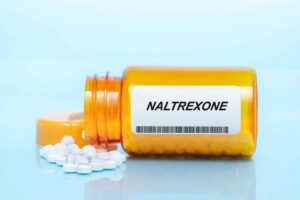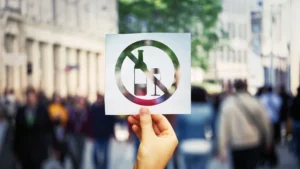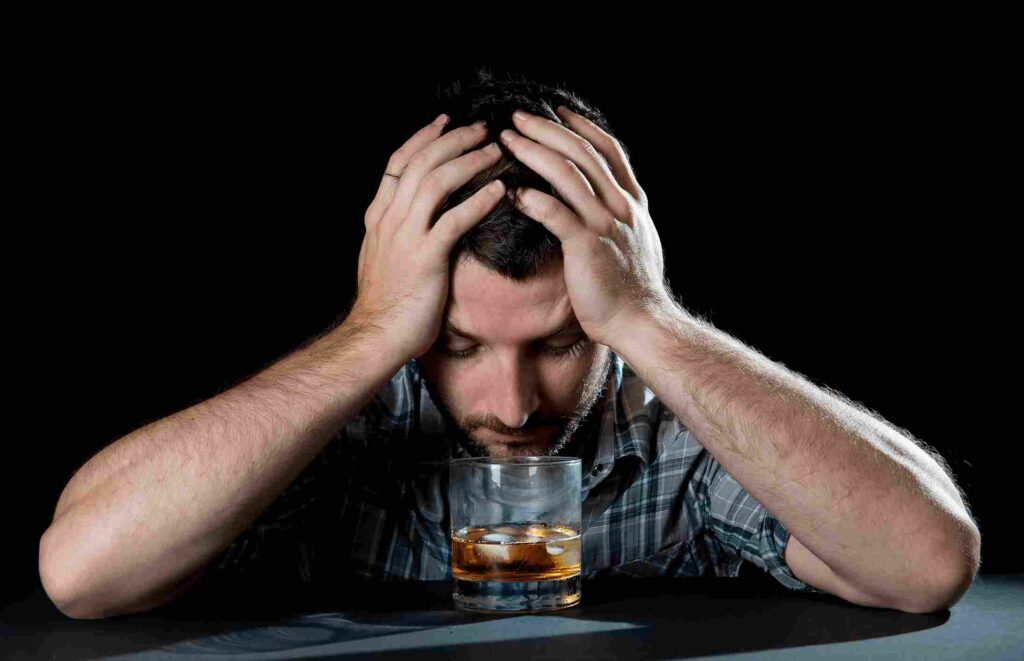In a world where the battle against alcohol addiction can seem insurmountable, a beacon of hope emerges in the form of naltrexone. This medication, often overshadowed by more conventional treatments, holds remarkable potential in curbing alcohol cravings and aiding individuals on their journey to sobriety. In this blog, we delve into naltrexone for alcohol cravings, its mechanism of action, its effectiveness, and practical tips for those considering or currently using it as part of their recovery journey.
Contents
Is Naltrexone Used To Treat Alcohol Dependence?
 Yes, naltrexone is indeed used to treat alcohol dependence. It operates by blocking the euphoric effects of alcohol and reducing cravings, thus making it easier for individuals to control their drinking.
Yes, naltrexone is indeed used to treat alcohol dependence. It operates by blocking the euphoric effects of alcohol and reducing cravings, thus making it easier for individuals to control their drinking.
By targeting the brain’s reward system, naltrexone helps break the cycle of addiction by diminishing the reinforcing effects of alcohol consumption. This makes it a valuable tool in the arsenal of treatments for alcohol dependence.
Clinical studies have demonstrated the efficacy of naltrexone in reducing alcohol consumption and promoting abstinence. It is often used as part of a comprehensive treatment plan that may include therapy, support groups, and lifestyle changes. Naltrexone is particularly beneficial for individuals who struggle with cravings or find it challenging to maintain sobriety on their own.
What Would Happen If You Drink Naltrexone?
If someone consumes naltrexone intentionally, it’s important to note that it’s unlikely to produce any euphoric or pleasurable effects. Naltrexone is an opioid antagonist, meaning it blocks the effects of opioids and alcohol on the brain’s receptors. Therefore, drinking alcohol while on naltrexone may not lead to the usual sensations of intoxication, such as euphoria or sedation.
Instead, the individual may experience fewer rewarding effects from alcohol, potentially reducing the desire to continue drinking. However, consuming alcohol while taking naltrexone can still have adverse effects on the body, including an increased risk of alcohol-related accidents or injuries, gastrointestinal discomfort, and exacerbation of liver problems. Therefore, it’s essential to follow healthcare provider instructions carefully and abstain from alcohol while taking naltrexone.
How Does Naltrexone For Alcohol Cravings Work?
 Naltrexone works by blocking the effects of opioids and alcohol in the brain, particularly on the opioid receptors. These receptors play a crucial role in the brain’s reward system. This is responsible for reinforcing behaviors that are pleasurable or rewarding, including the consumption of alcohol. When someone drinks alcohol, it triggers the release of endorphins, the body’s natural opioids, which contribute to the feelings of pleasure and reinforcement associated with drinking.
Naltrexone works by blocking the effects of opioids and alcohol in the brain, particularly on the opioid receptors. These receptors play a crucial role in the brain’s reward system. This is responsible for reinforcing behaviors that are pleasurable or rewarding, including the consumption of alcohol. When someone drinks alcohol, it triggers the release of endorphins, the body’s natural opioids, which contribute to the feelings of pleasure and reinforcement associated with drinking.
By blocking opioid receptors, naltrexone interferes with this reward process. Specifically regarding alcohol, naltrexone reduces the reinforcing effects of alcohol consumption, making it less pleasurable and reducing the desire to continue drinking. This mechanism helps individuals control their drinking behavior and diminishes cravings for alcohol.
Essentially, naltrexone disrupts the cycle of reward and reinforcement associated with alcohol consumption. And, providing a valuable tool in the treatment of alcohol dependence. It’s important to note that naltrexone does not eliminate the physiological effects of alcohol, nor does it directly prevent someone from drinking.
This medication is most effective when used as part of a comprehensive treatment plan. Together, this addresses the underlying factors contributing to alcohol dependence.
What Are The Benefits You Can Expect?
When using naltrexone for alcohol cravings, several benefits can be expected:
- Reduced Cravings: Naltrexone is effective in diminishing the intensity and frequency of alcohol cravings, making it easier for individuals to resist the urge to drink excessively.
- Decreased Alcohol Consumption: By blocking the rewarding effects of alcohol, naltrexone helps individuals moderate their drinking behavior. Hence, leading to a reduction in the amount of alcohol consumed.
- Increased Abstinence Rates: Studies have shown that naltrexone can significantly increase the likelihood of achieving and maintaining abstinence from alcohol, particularly when combined with counseling or therapy.
- Improved Treatment Outcomes: Incorporating naltrexone into a comprehensive treatment plan can enhance overall treatment outcomes for alcohol dependence, increasing the chances of long-term sobriety and recovery.
- Enhanced Quality of Life: By helping individuals regain control over their drinking habits, naltrexone can lead to improvements in various aspects of life, including physical health, relationships, and overall well-being.
It’s important to note that the benefits of naltrexone may vary from person to person. And its effectiveness can depend on factors such as dosage, adherence to treatment, and individual response.
What Are The Negative Effects Of Naltrexone?
While naltrexone is generally considered safe and well-tolerated, like any medication, it can cause side effects in some individuals. Common side effects of naltrexone may include:
- Nausea
Nausea is one of the most commonly reported side effects of naltrexone, especially when first starting treatment. This side effect usually diminishes over time as the body adjusts to the medication.
- Headache
Some individuals may experience headaches while taking naltrexone. These headaches are typically mild to moderate in intensity and often improve with continued use of the medication.
- Dizziness
Naltrexone can cause dizziness or lightheadedness in some people, particularly when standing up quickly. It’s essential to be cautious when performing activities that require alertness, such as driving until you know how naltrexone affects you.
- Fatigue
Feeling tired or fatigued is another potential side effect of naltrexone. This side effect may occur initially but often improves with time.
- Insomnia
While less common, some individuals may experience difficulty sleeping or insomnia while taking naltrexone. If insomnia persists or becomes bothersome, it’s essential to discuss it with a healthcare provider.
- Liver Function Abnormalities
In rare cases, naltrexone can affect liver function, leading to abnormalities in liver enzyme levels. Regular monitoring of liver function is typically recommended, especially for individuals with pre-existing liver conditions.
- Allergic Reactions
Although rare, some people may experience allergic reactions to naltrexone, including rash, itching, swelling, or difficulty breathing. Seek immediate medical attention if you experience any signs of an allergic reaction.
It’s important to discuss any concerns or side effects with a healthcare provider, as they can guide managing side effects or adjusting the treatment plan if necessary. Additionally, individuals taking naltrexone should be aware of potential interactions with other medications and disclose all medications and supplements to their healthcare provider before starting treatment.
What Are Natural Approaches To Reduce Alcohol Cravings?
 Several natural approaches can complement or serve as alternatives to medication for reducing alcohol cravings:
Several natural approaches can complement or serve as alternatives to medication for reducing alcohol cravings:
1. Mindfulness and Meditation.
Practicing mindfulness and meditation techniques can help individuals become more aware of their thoughts, emotions, and physical sensations. And, allowing them to better manage cravings and triggers for drinking.
2. Exercise
Regular physical activity, such as aerobic exercise, not only improves mood and reduces stress but also helps distract from alcohol cravings and promotes overall well-being.
3. Healthy Diet
Consuming a balanced diet rich in nutrients can support physical and mental health, reducing the likelihood of alcohol cravings. Additionally, certain foods, such as those high in protein and fiber, can help stabilize blood sugar levels and minimize cravings.
4. Herbal Supplements
Some herbal supplements, such as kudzu root, milk thistle, and passionflower, have been studied for their potential to reduce alcohol cravings and support recovery. However, it’s essential to consult with a healthcare provider before taking any herbal supplements, as they may interact with medications or have adverse effects.
5. Acupuncture
Acupuncture, an ancient Chinese practice involving the insertion of thin needles into specific points on the body, has been studied for its potential to reduce alcohol cravings and withdrawal symptoms. While more research is needed, some individuals find acupuncture helpful as part of their recovery journey.
6. Support Groups and Therapy
Participating in support groups, such as Alcoholics Anonymous (AA) or SMART Recovery, can provide valuable peer support and coping strategies for managing cravings and maintaining sobriety. Additionally, individual or group therapy can help individuals address underlying issues contributing to alcohol dependence and develop healthy coping mechanisms.
7. Stress Management Techniques
Learning stress management techniques, such as deep breathing exercises, progressive muscle relaxation, or guided imagery, can help individuals reduce stress and anxiety. These are common triggers for alcohol cravings.
8. Adequate Sleep
Prioritizing good sleep hygiene and ensuring an adequate amount of sleep each night can improve mood, cognitive function, and overall well-being, reducing the likelihood of alcohol cravings.
It’s important to remember that what works for one person may not work for another. So individuals may need to explore different approaches to find what works best for them. Additionally, seeking support from healthcare professionals, counselors, or addiction specialists can provide personalized guidance and support on the journey to reducing alcohol cravings and achieving sobriety.
Conclusion
In conclusion, naltrexone for alcohol cravings offers hope to individuals struggling by blocking the rewarding effects of alcohol and reducing the desire to drink. While it’s important to acknowledge that this is not a magic bullet and may not work for everyone. Moreover, natural approaches serve as alternatives for those seeking additional support.
By embracing a holistic approach to treatment and finding the combination of strategies that work best for each individual, it’s possible to conquer alcohol cravings and embark on a journey towards lasting sobriety and improved quality of life.
